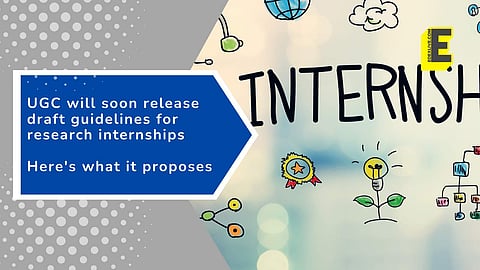

The University Grants Commission will soon release draft guidelines for regulating research internships in the Four Year Undergraduate Programme (FYUP), as suggested in the National Education Policy (NEP).
The guidelines mention two types of research internships that the students can undertake. The first kind will enhance the students' employability, whereas the second one will help develop research aptitude in the students, said the Draft Guidelines for Research Internship with Faculty and Researchers at Higher Education Institutions/Research Institutions, a copy of which was shared by UGC Chairman M Jagadesh Kumar with Edexlive, ahead of the release.
How credits will work
The research internship will comprise 20 credits from 160 credits for the FYUP. It will be compulsory for those students who wish to exit after two years with a certificate or a Diploma to have completed one research internship at the end of the second or the fourth semester of 10 credits for eight to ten weeks. Students who wish to complete the FYUP can choose to complete a second internship of ten weeks at the end of their fourth semester or the second year of the FYUP.
In addition to this, the draft guidelines have proposed Research Ability Enhancement Courses (REAC) to be offered by the respective Higher Educational Institution (HIE) worth 10 credit points in research and analytical tools and techniques, said the draft guidelines. For students opting for a four-year degree, their research internship will also comprise 30 credits awarded for their thesis or dissertation in interdisciplinary, multidisciplinary, or transdisciplinary areas, state the draft guidelines.
A breakdown of these 10 credits entails 450 hours of engagement in the internship activities. That means each credit is worth 45 hours of the internship. These research activities entail hands-on training or a Short Research Project, as suggested by the draft guidelines. The students can avail of these either in the same HIE or other research institutions or research laboratories.
Monitoring and supervision
When it comes to supervision, the Research Internship Supervisor from the host institute will monitor the intern, who will be evaluated based on the research output. The parent HEI will conduct a seminar by an expert committee in order to evaluate the research output. The internship plan will be prepared by both.
Additionally, the "Research Internship Programme (RIP) will be fully organised, executed and monitored by Research and Development Cell of HEI through a Nodal Officer", state the draft guidelines. These will be appointed by the Vice-Chancellor/Director/Principal/HoD of HEI on the recommendation of the Director R&D Cell.
In addition to the purpose and breakdown of the research internship, the UGC has also proposed a centralised portal where HIEs can enlist as an Internship Providing Organisation. Students can also search for internships of their choice, and details of such internships, including feedback, will be recorded on this centralised portal.
The UGC will release these guidelines on its official website soon for feedback from concerned stakeholders, said UGC Chairman, M Jagadesh Kumar.
